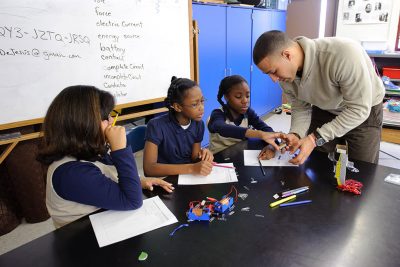
After four years of changing the face of education in Hartford, the Renzulli Academy is expanding its nationally renowned model of gifted-and-talented schooling to three new districts in Connecticut.
Starting this fall, students in Bridgeport, New London, and Windham will be able to attend schools for fourth-through-sixth graders modeled on the Hartford program, which has won plaudits for putting into practice the ideas of Board of Trustees Distinguished Professor of Education Joseph Renzulli, and his wife, Vice Provost for Academic Affairs Sally Reis. Renzulli and Reis are both faculty members in the Neag School of Education who have long championed the education of gifted students.
“It’s very exciting to see this,” says Renzulli. “This has always been the core of my work – kids who are going on to be inventors, designers, entrepreneurs.”
The three districts will fund the new schools, which may in the future expand beyond the 4th, 5th, and 6th grades, but the expansion was made possible by a $500,000 grant from the Jack Kent Cooke Foundation, Renzulli said.
“We know that high-potential, low-income students do best at schools that both challenge and support them,” says Lawrence Kutner, executive director of the Jack Kent Cooke Foundation. “Along with Hartford, these three districts are taking a significant step towards ensuring that children’s potential is not wasted.”
The Renzulli Academy in Hartford is based on the schoolwide enrichment model, which maximizes students’ potential and keeps teachers engaged and excited. (Peter Morenus/UConn Photo)
The academies in the new cities, like the original in Hartford, will follow a “schoolwide enrichment model” designed by Renzulli to maximize the development of students’ abilities and help keep teachers engaged and excited about their classes. The model includes everything from weekly sessions on special topics for teachers to the use of cutting-edge learning software.
“You can’t do the kind of teaching I advocate without the very best of technology,” Renzulli says.
The model has already reaped rewards in Hartford, where about 115 students attend the academy. As measured in both Connecticut Mastery Test scores and the state’s new School Performance Index, the Renzulli Academy routinely outperforms not only its peers in the district, but also many schools in affluent suburbs.
In 2012, for example, the Renzulli Academy was the only school in Hartford to surpass the state’s desired School Performance Index rating of 88, scoring 92.8 out of 100 – fully 10 points higher than the second highest performing school.
“The test scores are important, but the thing I’m proudest about in the academy is our kids entering and placing and winning in things like the National History Day contest, the Invention Convention, robotics competitions, and the like,” Renzulli says.
Along with the Jack Kent Cooke Foundation, Renzulli also credits Bridgeport Superintendent of Schools Paul Vallas, New London Superintendent Nicholas Fischer, and Windham Superintendent Ana Ortiz with their willingness to embrace the model, along with Steven Adamowski, the former Hartford superintendent who has been appointed by Gov. Dannel P. Malloy to be Special Master of the Windham and New London districts.
While some details remain to be worked out before class starts in the fall, including what selection criteria will be used and how many students will be accepted, Renzulli says he’s just excited to see the model expand, the first step in what he hopes will eventually be a roll out in districts across the country.
“In the real world, it’s the creative, productive kids who make a difference,” he says. “These kids clearly have that potential, which is why this is so important.”
 Facebook
Facebook
 Twitter
Twitter
 LinkedIn
LinkedIn
